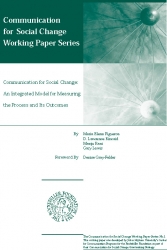Publications and Resources

Communication for Social Change: An Integrated Model for Measuring the Process and Its Outcomes
In April of 1997, 22 communication professionals, community organizers, social-change activists and broadcasters from 12 countries met in Bellagio, Italy, at a conference sponsored by the Rockefeller Foundation to examine the connections between social change and communication in the 21st century and to explore the possibilities of new communication strategies for social change. A follow-up meeting took place in Cape Town, South Africa, in 1998 and 2000 (Gray-Felder and Deane, 1999). The members of these meetings defined communication for social change as "a process of public and private dialogue through which people define who they are, what they want and how they can get it" (1999, p. 15). These meetings clarified the most important questions and provided the appropriate perspective for an inclusive and partici-patory model of social change, but they did not specify any particular model (Gumucio, 2001). Nevertheless, a consensus was reached regarding the key components of such a model:- Sustainability of social change is more likely if the individuals and communities most affected own the process and content of communication.
- Communication for social change should be empowering, horizontal (versus top-down), give a voice to the previously unheard members of the community, and be biased towards local content and ownership.
- Communities should be the agents of their own change.
- Emphasis should shift from persuasion and the transmission of information from outside technical experts to dialogue, debate and negotiation on issues that resonate with members of the community.
- Emphasis on outcomes should go beyond individual behavior to social norms, policies, culture and the supporting environment.
Following these recommendations, the Johns Hopkins University Center for Communication Programs, at the request of the Rockefeller Foundation, has developed the present report, Communication for Social Change: An Integrated Model for Measuring the Process and Its Outcomes. The purpose of this report is to provide a practical resource for community organizations, communication professionals and social-change activists working in development projects that they can use to assess the progress and the effects of their programs.